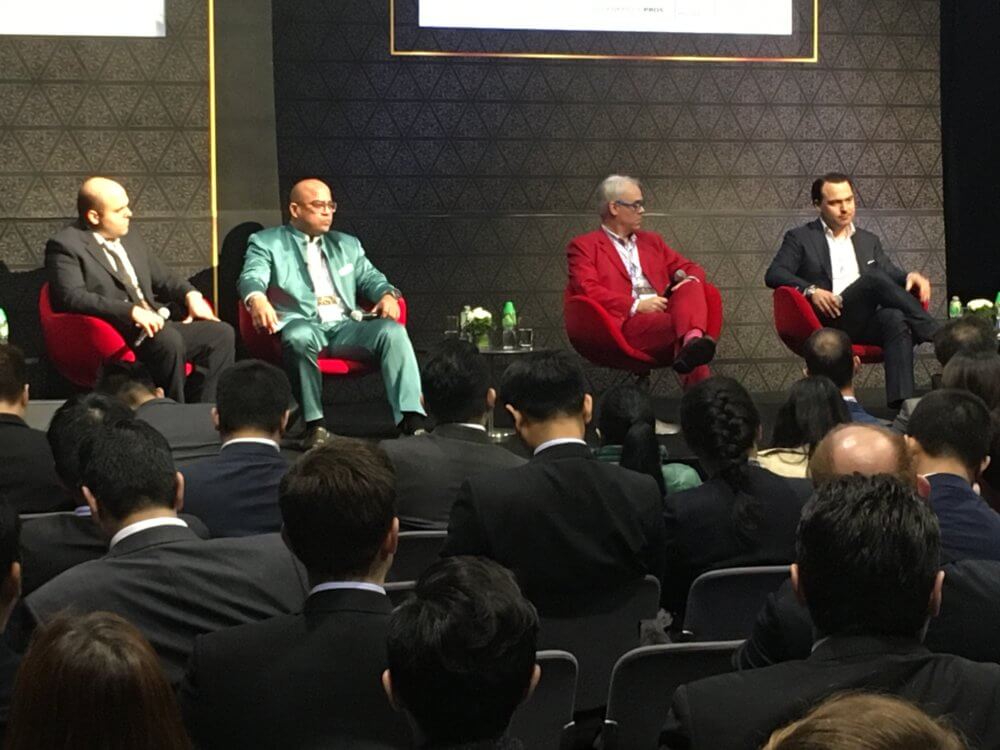Live from iFX EXPO in Hong Kong: CEOs of large Western firms focus on China; a heated debate ensues
A blustery and highly enthusiastic debate about FXCM, its impact on the world and potentially on China, a red suit and a green suit. If you want to know exactly how to future proof yourself when working with vital Chinese entities that are continually evolving and highly sophisticated, read with equal enthusiasm as the CEOs who spoke today!

It is certainly more than fair to deduce that the last twelve months have been extremely eventful and have in some cases provided a seat-of-the-pants experience for many global CEOs of electronic brokerages, have created even more reason to innovate and quickly reinforce sustainability in an ever-changing environment but also to rally toward forging ahead with new and important breakthroughs in order to avoid either being left behind, or, as has made itself as obvious as an alligator in a fish pond this month, decimated completely.
Here today at the Hong Kong Exhibition and Convention Center in Wan Chai, the first day of the iFX EXPO Asia 2017 FX industry conference is underway, produced by ConversionPros and industry news and research group Finance Magnates, where senior executives from across the world discuss their avantgarde corporate developments for the future, and just as importantly and part and parcel of that direction, how to make China a mainstay for Western firms.

Moderated and hosted by Finance Magnates Senior Editor Avi Mizrahi, this afternoon began with a highly energetic, and in some places somewhat heated, discussion among high profile CEOs within the technology, integration, retail brokerage and social trading platform sectors.
Commencing with a question, directed at Yoni Assia, CEO of eToro, the world’s largest social trading platform, Avi Mizrahi asked “Yoni, What are the best methods of attracting strategic partners in Asia?”
Mr. Assia, a charismatic and widely renowned industry figure, began the dialog by answering “In general, we are very much based on innovation and our core business is within a relatively new part of wealth management called social trading. When bringing partners to eToro, they should be partners that want to take a part in enabling investment in a strategic and democratized way. Quite simply, stategic partners need to align on long term stategy otherwise they are nothing more than distribution channels.”
Draco Ng, CEO at AETOS Capital concurred, saying “There are several important points to consider but certainly there is an emphasis in China on partnership and friendship, as real relationships matter. Secondly, safety of funds is critical, and that leads to the issue of getting money in and out of China. Chinese customers have to have face to face communication via meetings, as well as continual enggement on chat, and the face of the company is important.”
Flamboyantly attired with levels of eloquence to match, Mario Singh, CEO of New Zealand-based brokerage Fullerton Markets said “The two C’s are very significant in China, those being credibility and competence.”
“Chinese customers continually analyze how credible firms are, and what protection is behind them. We tied up with AIG to provide trustee liability insurance for clients. Standing your ground in terms of competence is very important” said Mr Singh.
Introducing this extremely vigorous discussion was Jonathan Fine, Head of Content at Finance Magnates, who alluded to the differences perceived in China compared to the West when referring to the connotations drawn by red and green, which conjur opposite perceptions in China compared to the West.
Mr. Fine’s amusing anecdote stated that attention must be paid to this difference, however on today’s panel, this has been personified!

Tom Higgins, CEO of British trading platform integration and liquidity management software company Gold-i said “What we have found as a technology provider is that honesty and integrity are extremely important in China, as is visibility. People want to come to the office. In other parts of the world, many customers would conduct the entire onboarding process remotely and sign their contracts remotely, but in China they prefer face to face meetings and it is much more relationship based, on a much more personal basis than in other parts of the world.”
Christian Frahm, CEO of institutional prime brokerage and technology provider CFH Group followed on from that, adding that initially the company had decided to establish in China, but found that despite the need to continually meet with brokers and partners, they wanted a reasonable distance between their operations and that of their prime brokerage and remarkably Mr. Frahm explained that the company encountered conflicted times because some of the brokers in China are also servicing other smaller brokers. “We therefore decided to take the decision to establish an office in Hong Kong” he said.

Mr. Assia said “You probably need one of those sophisticated offices which has that beautiful table with the integrated tea machine and have to learn to make tea in the Chinese style, to entertain partners.”
After Mr. Assia’s amusing anecdote, moderator Avi Mizrahi posed a question on that basis to Mr. Frahm, relating to future-proofing the structure of brokerages in China. “We have seen the CEO of a big American company have to stand down due to a regulatory purge just recently. How does it work in China and what will the regulatory environment be like?” he asked.
Mr. Frahm answered
“It is currently very hard to say when regulation will be invoked in China, however I have been in this industry for a long time, and remember that in Japan there were once about 1,000 firms and the ones who survived are the ones which came to terms with and did well at preparing themselves for a stringent regulatory structure. It will come to China, firms should make steps today, that way they’ll be ready. Japan went from 1,000 brokerages to just 60 in 2 years, and just a few weeks ago we saw a drastic move from Turkey, and whilst I don’t believe that the Chinese approach will be as drastic as that of Turkey, regulation is coming and those who prepare properly will be the long term winners” – Christian Frahm, CEO, CFH Group
Mr. Assia expanded on that, saying that “Essentially we have a situation at the moment in whcih there is Europe, the US, and then the rest of the world. In the US and Europe, companies are only allowed to do what they are strictly allowed to do, and vice versa. In Asia things are very different. For example, in Israel, we say “nobody told me not to do it” and we can see this dynamic also prevalent in Russia, and in Asia, and this is a very different to doing things the American or British way.”
“When you are in the area of doing what is ‘not not allowed’, there is always a risk of new regulatory probing, and if that leads to new laws, then business is affected” – Yoni Assia, CEO, eToro
“We were late coming into China, but under the strategic partnership that we forged with PingAn, this created a top quality environment.
“We are still looking at a couple of years of things still being uncertain in alot of places around the world, such as the restrictions on being able to trade overseas and open bank accounts and work overseas, but that is a large question that has hung over ever industry participant for several years and even since the dawn of regulatory oversight for OTC firms” said Mr Assia.
Mr. Higgins then added “I have seen a change in the types of systems that are being used. A year ago, many brokers in China were buying a price feed and then b booking everything, but now they are buying proper solutions with liquidity management and full ability to process orders directly to the liquidity providers, and are preparing for any regulatory establishment in a much more professional way.”
Mr Singh then said “I have a slightly different perspective. The regulatory structure in many regions can really be seen as a double edged sword. Of course the idea is to make sure no scams come in, and that retail people arent being taken for a ride, but its been draconian and that is what constricts the entire market. As leaders of the industry we should engage the regulatory bodies to show them the framework of how we operate. China will probably take some of its ideas from some of the major regulated regions, and from directives already in place in those regions by the FCA, NFA, CFTC, ASIC and CySec, and potentially there could be a knock on effect as other Asian regions will likely follow.”
“For certain, in China there is a need to deepen capital markets, but at the same time not to constrict them. China is trying to stop the slide of the RMB, as hundreds of millions are leaving China, so its domestic market is of great importance and highly protected by the government” he said.
Mr. Ng, an expert in Chinese financial services, added “Do the right thing. Do it legally in China. In many asset classes and industry sectors, such as the large affiliate businesses, as well as gold, silver, oil and other similar commodities, there is no regulator to govern in this area, but now gold is not allowed unless you have a local license.”
FinanceFeeds is aware of an incident that occurred in Shenzhen last week in which the police came to the office of a precious metals electronic trading company and arrested all 200 staff, and took them out of the office, the reason being that the firm did not have a local license for that specific province.

On this basis, Mr. Ng said that trading FX in China is still good and offers a tremendous amount of freedom and access to liquid markets because there isn’t such restriction.
How to do the right thing in China
Mr. Ng said “One way we can do it right in China is to ensure that the entire corporate operations of a firm are on the right side. If a company wants to have business in China, it would need to have a local server, and to manage internet restrictions.”
“Government control is healthy, they are not trying to destroy the industry but instead are aiming to ensure stability for the economy. People may feel more comfortable to trade under a regulatory environment”- Draco Ng, CEO, AETOS Capital
Heated FXCM debate
The ever polite Avi Mizrahi then raised, albeit in an eloquent manner, the bete noire of the month, that being the fate of FXCM, which has created substantial opinion and an equal amount of concern among senior FX industry executives globally, something that FinanceFeeds has been extensively detailing over the course of the past few weeks.
This concern and opinion gave rise to a heated discussion, which began with Mr. Assia saying “The FXCM situation is unfortunate, and if you actually read the fine print, FXCM did not actually concur with anything that the regulator is leveling at them. They did not admit to having actually done what the regulator says they did, did what the regulator said they did, really emphasizing that we have no idea whether they actually were acting against the regulations.”
“We have seen an unfortunate series of events since the Swiss National Bank’s removal of the 1.20 peg on the EURCHF pair in January 2015, and that perhaps led to an economic decision FXCM could be better off withdrawing from the US as a means of paying the debt to Leucadia and reducing coss. FXCM has always a very very good company that was promoting the idea of non-dealing desk execution and direct market access, and this is a very unfortunate chain of events that has happened to a good company, but that is the risk and our business is all about risk management.” – Yoni Assia, CEO, eToro
Mr. Higgins then interjected “I disagree completely Yoni. There is a phrase I learned in business school which is ‘if it talks like a duck, if it walks like a duck and if it quacks like a duck, then it’s a duck’. It is quite clear that this applies here and a company can expect to get into trouble if its management tries to get around it by saying that they are a NDD and then having an interest in another company which is undisclosed which trades against its clients!”
Mr. Assia retorted “You’re assuming that this is what actually happenned, but nobody from the other side has admitted it, so think about it! It’s a troubling event!”
Mr. Higgins then replied “This was put forward to the public by a highly regarded national regulator. If it was not correct, then why didn’t FXCM contest it?”
Mr. Frahm, sitting between the blustery conversation, then brought is perspective into the forefront. “The problem with what FXCM has been caught doing, is that it now creates a problem for the industry. FXCM was an early innovator and was a good company and I don’t want to speak badly about Drew or what happened at FXCM but there is a fundamental problem with going out there and saying you operate a non-dealing desk model and then going out of your way to do it via the back door. Some say they were giving worse fills than promised and were looking at the order books, however there are a lot of factors here, and it is hard to judge.”
Mr Higgins then said “We have been working with FXCM for years and I know Drew personally and we have never had a complaint from anyone about poor execution, actually quite the opposite as many customers have seen them as a good execution engine, so it is very unfortunate to see that they were engaging in these practices that they have now been caught for.”
Mr. Ng then said “What I find so interesting is why the regulator made this decision so late. FXCM made a very good job to make a good name for themselves but for many years it seems that foul play has been going on, so that is a great shame to see.”
“Yes, that is one of the very unfortunate things that go toward writing history. When something like this happens it’s a tiemly reminder for all industry leaders that change is happening so fast, and that you have to disrupt, and if you aren’t prepared to disrupt, you may as well leave the industry.” – Mario Singh, CEO, Fullerton Markets
Composed as ever, Avi Mizrahi made the final comment on the FXCM matter, saying that there had been requests from today’s audience, many wanting to know the opinions on this matter from CEOs with this level of experience, and then steered the subject away from the clearly polarizing views on FXCM and back onto the main challenges that face firms approaching China.
Mr Frahm said “It is a fantastic growth market but operating without a regulatory framework is risky and as in other places, they may overregulate if it goes on too long unregulated. The regulators generally get worried if everything gets on the radar and if firms are running too much risk, so it may be that this comes back to haunt. Similarly, however, not operating with regulation for a long time will be a problem if peoopel dont take care.”
Mr. Assia then explained “When you think about Chinese financial regulation that currently exists, it can be dissected into two categories.
“There is a very strict set of regulations that apply to the securities industry in China. No API tading is allowed, and no short selling is allowed, so there is very tight control on that sector, yet on the other hand there is a very large area of shadow banking or internet finance, which is represented by the emergence of very large players such as Lufax and the P2P industry. That entire set of new companies is very loosely regulated and the Chinese government did this on purpose in order to let this be big. The government wants to embrace disruption and innovate on the internet. The problem with this is that when the whole thing crashed, a lot of people were replaced within the regulatory divisions, however China is a very smart nation. Maybe with Trump in office, the US will become even smarter and say that for every 1 regulation you need to kill 2 old ones, so maybe China will go like that too” – Yoni Assia, CEO, eToro
Mr. Assia continued, saying “CySec and the FCA were clever in realizing that the world is becoming global and consumer orientated and you need to have better products for consumers.”
Mr, Singh then replied “Everyone here needs to pay attention to policy and culture. Exactly a month ago, China announced a 100 billuon Yen investment for the internet fund, therefore understanding how the country is moving forward is important. Culturally, people want to know who you are, and as a result of this, it is not possible to just hire someone to take care of the Singapore or China office. Chinese partners want to know the CEO and founder.”
Mr. Higgins then explained
“One area that I am concerned about at the moment in China is that we see a lot of brokers starting up as new businesses. Sometimes I sign 5 contracts in a week for new brokers, but there are a lot of failures too and when there are, retail cleints are probably being hurt and that is bad for the industry” – Tom Higgins, CEO, Gold-i
Mr Assia said that if Chinese insurance companies could devise an insurance policy to insure customer funds, this would create a lot of trust.
As far as cultural differences and infrastructural concerns are concerned, Mr Higgins said that the great firewall does pose issues. “We opened our Shanghai office and put the servers inside China, which means that we are immune from internet restrictions. A combination of factors should be considered when looking at speed and flow of data, not just government blocking but also the amount of data going in and out of China is so massive that the data pipes dont always handle it” he said.
Mr. Assia said “Yes indeed, and also there are other technological matters that need attention, we had to replace the red and green colors and transpose them because up and down are in opposite colors on Chinese trading platforms compared to the rest of the world.”
Mr. Singh displayed great optimism in the future of Chinese infrastructure, referring to the 100 RMB fund launched by the government to deepen the remit of the country’s infrastructure, and a lot of that depends on connectivity so there is light at end of tunnel from infrastructure point of view.
Mr. Assia said “Chinese traders are very smart and we are seeing very sophisticated traders that understand systems arbitrage, latency, and how pricing is done.”
“The questions around why are there more very englightened and educated traders in China than elsewhere is down partially to culture, but in other places, for example in Israel, the arbitragers work on regulated exchanges in North America, Britain and Israel, and have smart quant traders that sit on the exchange and make money from arbing the market via HFT. In China, the APIs are blocked and the Chinese prefer not to do arb inetrnaally so they are arbing the overseas firms because there is no equivalent of HFT on exchange.” – Yoni Assia, CEO, eToro
“Mr Higgins said “Yes, you are right. Brokers can actually find traders that are picking them off and making money out of them when they shouldn’t be by using arbitrage techniques. We launched the Visual Edge product which provides a full set of analytics to brokers, and many Western firms could see these traders on their analytics, and had previously not been aware that they had them, however in China, firms know they have them because it is far more obvious that they exist.”
Q&A with Andrew Saks-McLeod
At the end of what had been a fascinating and very well conducted discussion, an opportunity for questions was presented, at which point FinanceFeeds CEO Andrew Saks-McLeod asked the CEOs their opinion on something that may require a considerable re-think in China.
With the situation that FXCM now finds itself in, and the reason behind that situation being a fundamental betrayal of regulatory and customer trust, Andrew Saks-McLeod asked “I have visited many large introducing brokers with offices that are as large and in some cases larger than many non-Chinese retail broker-dealers, and these introducing brokers, all of which are in the second tier development towns across China, many of which are managing funds in excess of $300 million for investors (not traders) who do not have a relationship with the broker, but instead work only with the introducing broker, which they view as their portfolio management company.
The vast majority of those firms use FXCM as one of their major brokers, therefore the question to the CEOs centered on whether the FXCM debacle will destabilize the current IB status quo in which IBs in China use western brokers and rely on them for complete stability and transparency, and if the entire industry will now go completely domestic and eschew foreign firms altogether, as in China, once the trust is gone, it’s gone.
Mr. Assia answered by saying yes, the way to leverage this and ensure that this does not create an exit is to go completely Chinese. When we were invested in by PingAn, we then expanded within China as a PingAn company, which is a vast Chinese bank and therefore provides complete investor confidence and transparency as it is a mainstay in mainland China. FinanceFeeds met recently with Jasper Lee, CEO of eToro for the APAC region, who detailed all during a meeting in Shanghai.
Mr. Frahm said “You’re right Andrew. When this type of thing involves a large, highly well regarded company in a good jurisdiction like FXCM, it is a big problem and it raises questions for everything else. On a more general note, if you check any other market that is going through development, they will diverge toward local players. In five years’ time, it will be local companies dominating the entire Chinese market, with a big opportunity for local Chinese companies being helping provide the serices FXCM currently does. It will be dominated by good, qualty chinese firms.”
That is absolutely right. According to our research in mainland China, the entire nation is gearing up for a completely domestic ecosystem.
Mr. Singh said “There are two means of ensuring longevity, one is via organic growth, and the other is via collaborative growth. Tying up with Alibaba, PingAn, WeChat, and other important Chinese commercial linchpins is important, and it all comes down to resourceful creation. If you are going to build a business for sustainability to last throughout the generations, you must figure out how to create massive value for the company you are leading.”
Mr. Higgins concurred, saying that “We are a British company, however we started the Shanghai entity as a completely Chinese company altogether, therefore it is entirely possible that whilst today, the Chinese entity is a subsidiary of the British firm, it is possible that the balance may shift. It may be that the UK division may be run from Shanghai and the UK division may then become a subsidiary of the Chinese entity rather than vice versa.”
Concluding, Mr. Ng said “IBs have been in this industry in China for more than 10 years. FX is their career so they will have a soft transition period, so they will still want to find something good for them, and the reputation and credibility, regulated by FCA or ASIC is still considered more credible locally and of course credibility is everything in China, and how business is conducted really matters, so bearing this in mind the large well organized IBs still have the ability to mitigate any potential loss of trust if FXCM goes out, they just need a good stategy doing joint ventures with local partners, and to consider themselves a service provider.”
We can certainly see how things have evolved. This is the tenth iFX EXPO conference, and is still the best example of a business to business FX industry convening in the entire world. Five years ago, a discussion between CEOs would have centered on how to acquire clients and get leads for retail brokerages. Just look at the difference. How far we have all come, and the continued insight into how to work in future is a credit to every member of today’s panel, which was extremely well organized and very interesting, and most of all, of tremendous value in terms of senior FX industry thought leadership.









